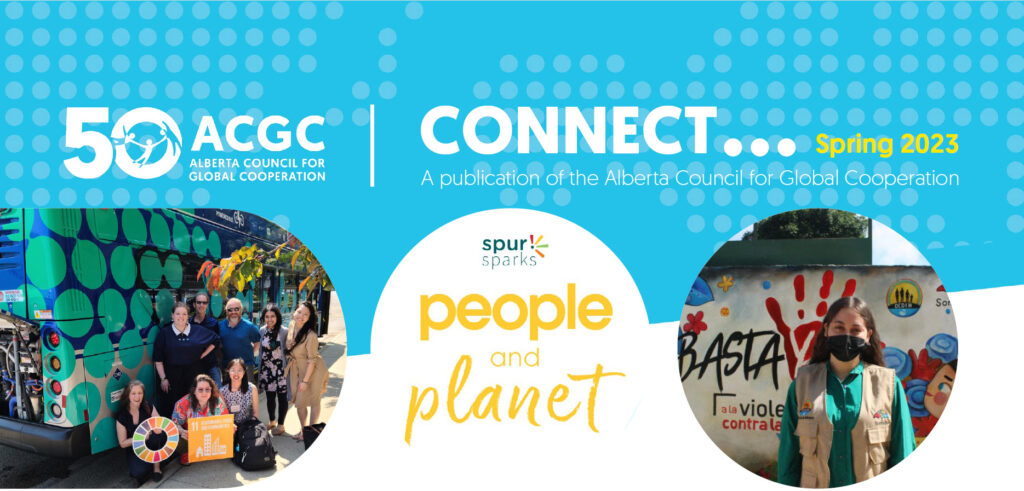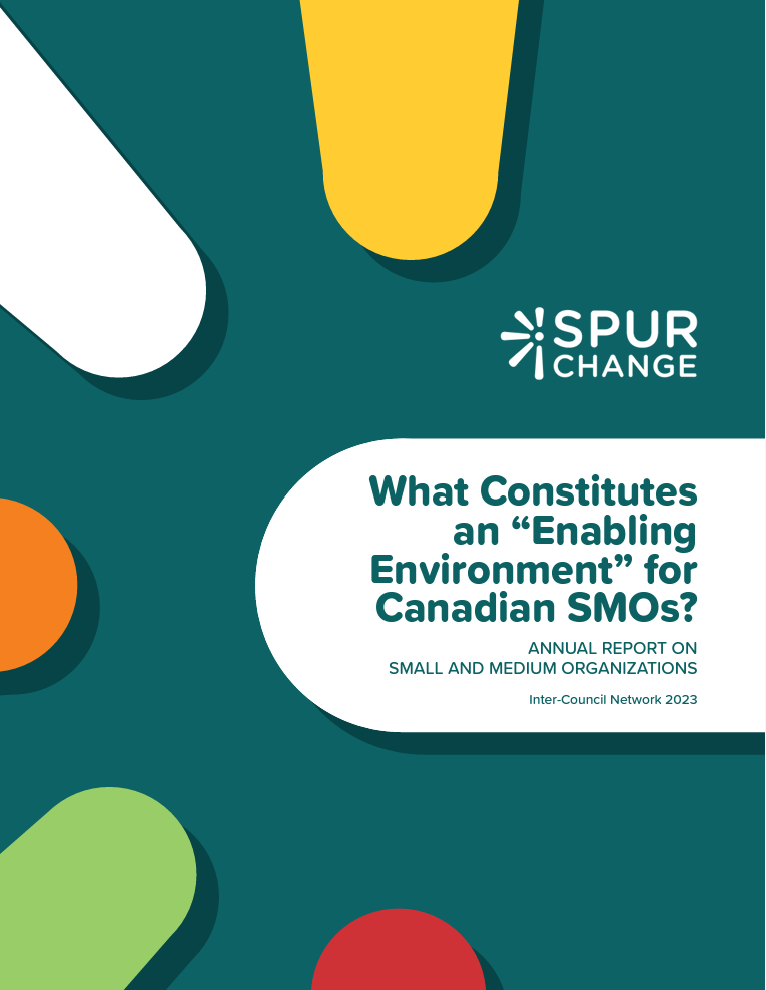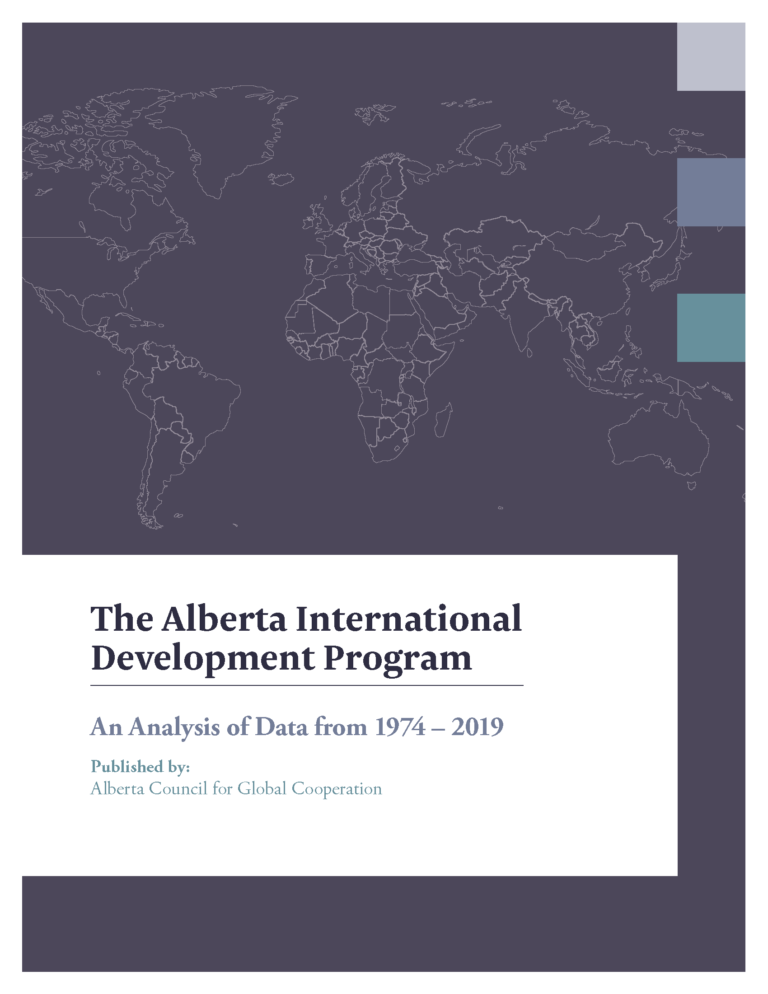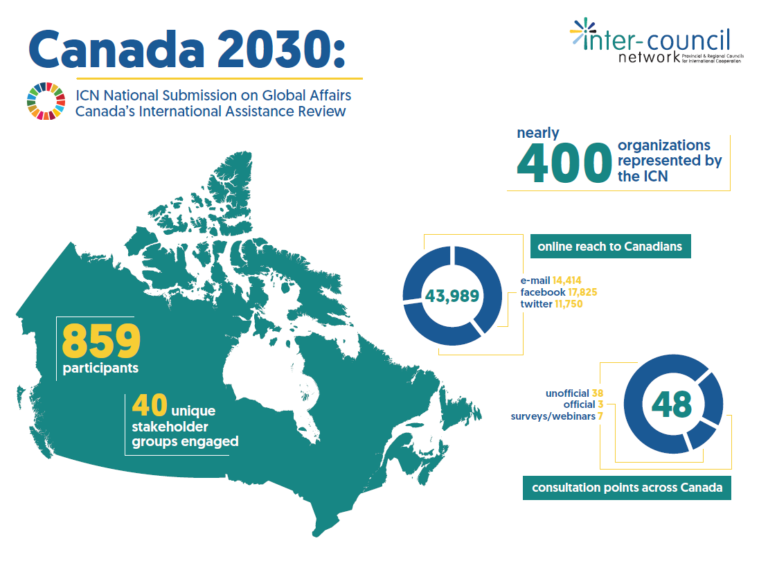Publications
ACGC’s Connect Newsletter
Read up on what ACGC has been up to lately!

- Spring 2023: Let us make no small plans
- Winter 2023: ACGC’s 50th Anniversary
- Fall 2022
- Summer 2022
- Winter 2021
Spur Change 2023 SMO Report: What constitutes an “Enabling Environment” for Canadian SMOs?
Download the full report | Download the executive summary

An environment with favorable policies and where opportunities for funding, public engagement, networking, and collaboration abound is fertile ground for a vibrant civil society, including strong and well supported SMOs. But what does this look like in practice? Is the current Canadian environment an enabling one?
Released on May 26, 2023, this report analyzes both the challenges and benefits associated with Canada’s enabling environment and identifies ways to strengthen and facilitate the crucial international cooperation work carried out by Canadian SMOs.
ACGC Response to the Draft K-6 Social Studies Curriculum
Preliminary Analysis: June 2021
This document is the Alberta Council for Global Cooperation’s (ACGC) response to the Draft Social Studies K-6 Curriculum released by the Government of Alberta on March 29, 2021. ACGC conducted the analysis of the draft social studies curriculum to better understand the alignment of the draft with global citizenship education (GCE) best practices.
The Alberta International Development Program
An Analysis of Data 1974-2019
Author: ACGC
Published: September 2020
Purpose

After 45 years, the Government of Alberta eliminated the International Development Program in October 2019. Following this announcement, the Alberta Council for Global Cooperation (ACGC) launched a review of the international development program (herein called ‘the program”) to better understand the program’s history and scope, as well as the impact the program had across the globe. Using data available online, as well as data accessed through a freedom of information request made to the Government of Alberta, this analysis aims to provide insight into four key areas of the program, including:
- The annual budgets and expenditures over time
- The number and location of Alberta organizations which received funding
- The types of international development projects supported with the funding
- The countries and regions impacted by the contribution of Albertan
Through sorting, publicizing, and analysing the data received from the Alberta Government, ACGC hopes the findings can serve to amplify the public’s understanding of the impact Albertans have had on reducing poverty around the world.
Together 2020: Conference Report
Download the Conference Report
This virtual conference featured over 100 speakers and was attended by over 1,400 unique users from across Canada and around the world In an increasingly online world, the conference demonstrated the ability to further use digital tools to strengthen and create feelings of belonging.
A Feminist Approach to Climate Justice
Authors: ICN, ACGC
Published: June 2019
The Inter-Council Network Youth Delegates attending Women Deliver have participated in a collective process, forming a policy document “A feminist approach to climate justice.”
Together 2017 – Collaboration, Innovation, and the Sustainable Development Goals
This symposium report is based on the outcomes of Together 2017, the first ever multi-stakeholder SDG Symposium in Canada. Hosted by the Alberta Council for Global Cooperation (ACGC), the Symposium brought together over 270 attendees, representing 150 organizations.
International Assistance Review Consultation: Reports
Authors: ACGC, ICN, CCIC
Published: July 2016
Reports submitted to Global Affairs Canada as part of the international assistance review and consultation process held by the Minister of International Development and La Francophonie, Marie-Claude Bibeau between May 18 – July 31, 2016.
Read more
International Assistance Review: What We Heard
Global Affairs Canada released their report, ‘What We Heard’, reporting on the major themes emerging from the consultation process. View Global Affairs’ website to read the results.
International Assistance Review Consultation: Reports
Download the Inter-Council Network’s submission

From May 18th to July 31st 2016, Minister of International Development and La Francophonie, Marie-Claude Bibeau, held the international assistance review and consultation process. It was the first opportunity in over a decade for civil society to voice their opinions on what Canada’s role in the world should look like. ACGC engaged in extensive consultations with our membership as part of the International Assistance Review process. We held in-person consultations in both Edmonton and Calgary, with opportunities for remote participation, had an online survey for our members, and participated in two high-level consultations hosted by Global Affairs Canada (GAC), including partnering with GAC on their high-level consultation in Calgary focusing on the topic responding to humanitarian assistance and the needs of displaced persons.
Using the feedback gathered from our members, ACGC contributed to the International Assistance Review in three ways: ACGC wrote an ACGC submission summarizing the recommendations from our members, contributed to the Inter-Council Network submission, and the Canadian Council for International Cooperation submission. In addition to topic specific recommendations, ACGC’s submission outlines 5 key recommendations that Canada’s international cooperation should adhere to:
- Domestic and international leader in the realization of the SDGs. All of Canada’s international development work should be underpinned by the SDG framework and integrate all the economic, social, and environmental pillars of the 2030 Agenda
- Sustainable development based in long-term relationships with local communities
- Partnership, rights, and solidarity-based development with updated language
- Increased and diversified development funding that is decoupled from trade goals
- Integrated whole-of-Government and whole-of-Canada collaborations for sustainable development.
Small and Medium Sized Organizations as Development Actors: A Review of Evidence
Author: Brian Tomlinson
Published: May 2016
Download the report in English | Download the report in French
Specialized, well-connected, and flexible, small and medium sized organizations play a crucial role in international development and public engagement in Canada. They operate in our cities and communities, and their impact stretches beyond our borders to reach the most vulnerable in our world.
Canadian Perspectives on International Development: Report of Results
Collaborators: Engineers Without Borders Canada, Inter-Council Network, and the Bill and Melinda Gates Foundation
Published: February 2015
This report is the results of a commissioned a public opinion poll conducted to gain an understanding of Canadians’ knowledge of, opinions on and engagement in global poverty issues.
Albertan Views: Global Poverty Study
Author: ACGC
Date: January 2009
This report outlines the results of a province-wide and Canada-wide survey conducted by ACGC, in partnership with the Wild Rose Foundation and Angus Reid Strategies, which examined the public perceptions of global poverty and the role that Albertans (and Canadians) play in addressing this important issue.
Read more
Albertan Views: Perceptions of Global Poverty
Download the Presentation Part 1 and Presentation Part 2
Global poverty is a huge and complex issue. Garnering the support of the general public is a challenge in light of the myriad of social issues present on a daily basis. Thus, the Alberta Council for Global Cooperation (ACGC), in partnership with the Wild Rose Foundation and Angus Reid Strategies conducted a province-wide and Canada-wide survey in January 2009 which examined the public perceptions of global poverty and the role that Albertans (and Canadians) play in addressing this important issue. This survey would provide Albertans, including the Council and its members, with baseline information regarding Albertan perceptions of global poverty and the role that we all play in its eradication. This innovative study was the first of its kind carried out in Alberta.
ACGC was interested in learning:
- How important Albertans think global poverty is, compared to other social issues.
- How much Albertans knew about global poverty and the agencies and programs involved in addressing this issue.
- What Albertans perceived as effective programs for dealing with global poverty.
- What Albertans thought about their role, the role of government and the role of the international community in addressing global poverty